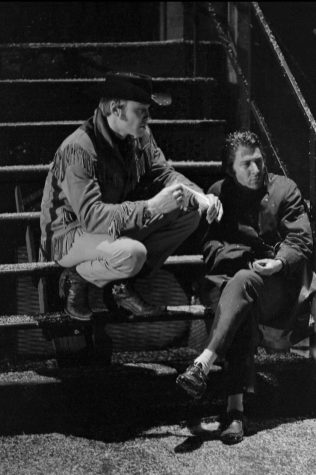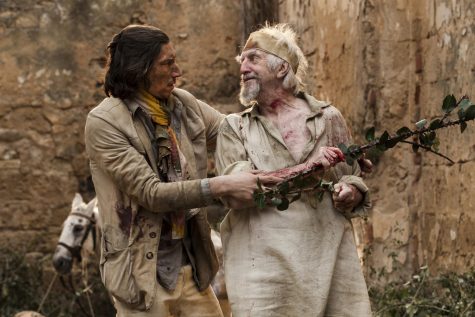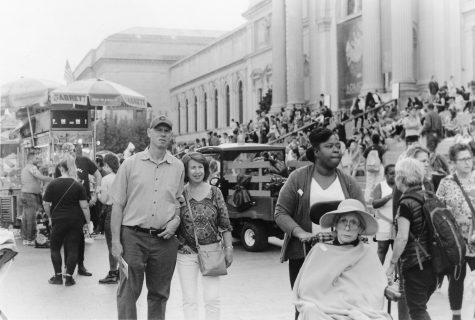TOP Finds Comedy in Chekhov’s The Cherry Orchard
Hang on for a minute...we're trying to find some more stories you might like.
Email This Story

The Cherry Orchard was performed by members of TOP at Collins Auditorium (Andrea Garcia/The Fordham Ram).
By Ryan Di Corpo
How can 14 actors gleam humor and satire from the story of 20th century Russian aristocrats who are pressured into auctioning their estate and then allow for the destruction of their beloved orchard? Such was the question Saturday night at Collins Auditorium during the Theatrical Outreach Program’s new production of “The Cherry Orchard.”
The final play by Anton Chekhov, “Orchard” is written as a comedy, but its themes of death, displacement and social collapse led theatre director Stanislavski to stage the play as a tragedy.
This history presents theatrical troupes with a choice: either to try and draw out the comedy in Chekhov’s writing or to emphasis the tragic elements of the play against the author’s intentions. Theatrical Outreach Program opted for the former, aiming to produce a show which, according to a statement by directors Luke Berman and Maura Cuddihy, would inject “life into the satire so cleverly put to page.”
The show, set in the round, opens with a confident Matt Schumacher as Yermolay Lopahkin, the ambitious but psychologically wounded son of peasants. Lopahkin, who has come to suggest auctioning the Raneskaya’s estate and chopping down her cherry orchard, is stuck waiting at the house with the maid Dunyasha, played by an expressive and wonderfully manic Tricia Whyte. Lopahkin’s initial suggestion to auction is laughed off by head of the family Lubov Raneskaya, portrayed by Kathryn Teaney as a woman of integrity and grace. Yet as the play progresses, Raneskaya and the other aristocrats slowly lose their fight against the estate’s auction, detaching themselves from the orchard by the show’s end and resigning themselves to what feels like certain fate.
Patrick Fox delivers a tender and humane performance as the elderly Firs, a character often dismissed for his advanced age and disregarded for his “muttering.” Firs represents the old-world aristocracy which, like the ill-fated cherry orchard, sit precariously perched on the edge of nonexistence. Firs is constantly ordered to silence by Raneskaya’s brother Leonid Gayev, played by an amusingly loquacious Sean Coffey. Here, the younger generation prattles on while the aristocracy of yesteryear fades into the scenery.
The show juggles well the complexities of a 14 person cast in which all the characters play critical roles. A purposefully uncomplicated set, comprised of a singular desk, two tree stumps and a royal purple divan among other things, complements well the intricacies of the show’s various storylines and themes. Further, this production does not shy away from exploring alternate paths, presenting an updated storyline involving a lesbian relationship between Dunyasha and the frequently exasperated Yasha (Mary Hurtsell).
The production is unquestionably funny: the dronings on of Gayev, the inscrutable lines from Firs, the lovable, hoping-to-be-loved buffoon that is Yepikhodrov (Michael Rinaldi). The show is even charming at times. It presents with youthful sensitivity the budding romance between Trofinov (Charles Buscarino), who claims to be beyond love and the intelligent but still naïve Anya, an outstanding Colleen Granberg.
But the question still stands: ought this to be a comedy? Directors Berman and Cuddihy write in the show’s program notes that the humor in “Orchard” derives from Chekhov’s desire “to point out the absurdity in existing class structures and their arbitrary changes.” There is plenty of absurdity to go around — see Gayev’s speech commemorating the centenary of a desk — but there are also moments of genuine tragedy which act to disturb the show’s humor. With “Orchard,” the play’s spectators are not presented with the hard decision of whether to laugh or to cry. They can do both, even within the same scene.












If you want a picture to show with your comment, go get a gravatar.